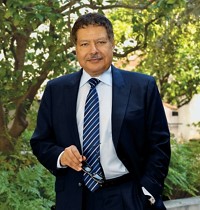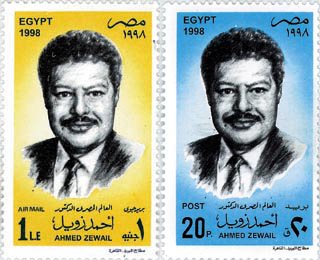Ahmed Zewail: The Father of Femtochemistry
Introduction: A Pioneer in Modern Science
Ahmed Zewail was a revolutionary scientist whose groundbreaking work in chemistry earned him the Nobel Prize and forever changed the way we understand molecular interactions. Born in Egypt and later becoming a prominent figure in American academia, Zewail's contributions to femtochemistry—the study of chemical reactions on extremely short timescales—laid the foundation for advancements in physics, chemistry, and medicine.
His legacy extends beyond science; he was also a dedicated educator, a global advocate for scientific research, and a diplomat who sought to bridge gaps between nations through knowledge and innovation. In this article, we will explore his early life, education, scientific achievements, and the profound impact he left on the world.
Early Life and Education
Ahmed Hassan Zewail was born on February 26, 1946, in Damanhur, Egypt, and raised in the nearby city of Disuq. From an early age, Zewail exhibited a deep curiosity about the natural world, a trait nurtured by his parents and teachers. His formal education began in Egyptian public schools, where he excelled in science and mathematics.
Recognizing his potential, his instructors encouraged him to pursue higher education in chemistry. He attended Alexandria University, where he earned his Bachelor's and Master's degrees in chemistry with distinction. His academic brilliance earned him a scholarship to the United States, where he continued his studies at the University of Pennsylvania, obtaining his Ph.D. in 1974.
The Path to Femtochemistry
After completing his doctorate, Zewail conducted postdoctoral research at the University of California, Berkeley, before joining the faculty at the California Institute of Technology (Caltech) in 1976. It was at Caltech where his most significant scientific breakthroughs would take place.
His pioneering work involved using ultrafast laser flashes—lasting femtoseconds (one quadrillionth of a second)—to observe and analyze chemical reactions as they occurred. Before Zewail's work, scientists could only theorize about the intermediate steps of chemical reactions. His innovation allowed researchers to see molecular bonds forming and breaking in real time, providing unprecedented insight into reaction dynamics.
The Nobel Prize and Scientific Impact
In 1999, Ahmed Zewail was awarded the Nobel Prize in Chemistry for his development of femtochemistry. The Nobel Committee hailed his techniques as transforming chemistry into a science that could observe motions of atoms during reactions, akin to a "slow-motion" replay of molecular events.
His methodology became essential across multiple disciplines, influencing drug development, material science, and nanotechnology. Scientists could now design more efficient chemical processes, understand catalysts better, and explore biological reactions at the molecular level.
A Champion for Education and Global Collaboration
Beyond the lab, Zewail was deeply committed to education and international cooperation. He played a key role in establishing the Zewail City of Science and Technology in Egypt, an institution dedicated to advancing scientific research and technological innovation in the Arab world. He also served as a science envoy for the U.S. government, promoting dialogue between nations through scientific collaboration.
His vision extended to future generations, as he emphasized the importance of nurturing young scientists and improving science education globally. He believed that knowledge was a universal language capable of fostering peace and progress.
Conclusion of Part One
Ahmed Zewail’s early journey—from a small Egyptian town to the pinnacle of scientific achievement—demonstrates his relentless curiosity and dedication. His invention of femtochemistry not only earned him the Nobel Prize but also redefined modern chemistry.
Stay tuned for the next part of this article, where we will delve deeper into Zewail's scientific techniques, his political and diplomatic roles, and his enduring influence on global science policy.Error: Response not valid
The Legacy of Ahmed Zewail in Modern Science and Education
Ahmed Zewail’s influence on science extended far beyond his Nobel Prize-winning research in femtochemistry. In the final part of this article, we explore how his work continues to shape scientific fields, his enduring contributions to global education, and the lasting impact of his vision for a more interconnected scientific world.
Advancements Inspired by Femtochemistry
Zewail’s pioneering techniques allowed scientists to observe ultrafast molecular processes that were once invisible. This breakthrough has enabled advancements in multiple disciplines:
- **Medicine and Drug Development* By understanding reaction mechanisms at femtosecond resolution, researchers can design more effective pharmaceuticals with precise targeting, reducing side effects.
- **Renewable Energy* Femtochemistry has contributed to improving solar cells’ efficiency by analyzing electron transfer processes in photovoltaic materials.
- **Nanotechnology* The ability to track atomic movements in real time has accelerated progress in nanoscale engineering.
With these applications, Zewail’s work has solidified its place as a cornerstone of modern chemistry and physics.
Leadership in Science and Diplomacy
Zewail was not only a scientist but also a global leader who believed in science’s power to bridge divides. He served as a U.S. Science Envoy to the Middle East under President Barack Obama, fostering collaborations between American and Arab researchers.
In 2009, he was appointed to President Obama’s Council of Advisors on Science and Technology (PCAST), where he provided insights on innovation policy and STEM education. His diplomatic efforts emphasized that scientific cooperation could transcend political boundaries.
Zewail City of Science and Technology
One of his most enduring legacies is the Zewail City of Science and Technology in Egypt, a visionary project aimed at creating a world-class research hub for the Arab world. This institution nurtures young scientists while promoting cutting-edge research in fields like biotechnology, renewable energy, and materials science.
Zewail envisioned this project as a way to combat brain drain and elevate scientific research in his homeland. Today, it stands as a testament to his belief in the power of education to transform societies.
Final Thoughts: A Vision That Endures
Ahmed Zewail’s life was a testament to the impact of curiosity, perseverance, and global solidarity. From his groundbreaking femtochemistry research to his efforts in science diplomacy and education, he left behind a legacy that continues to inspire.
As science advances, his work remains a foundation for future discoveries—proving that even the briefest moments, measured in femtoseconds, can change the world forever.










Comments